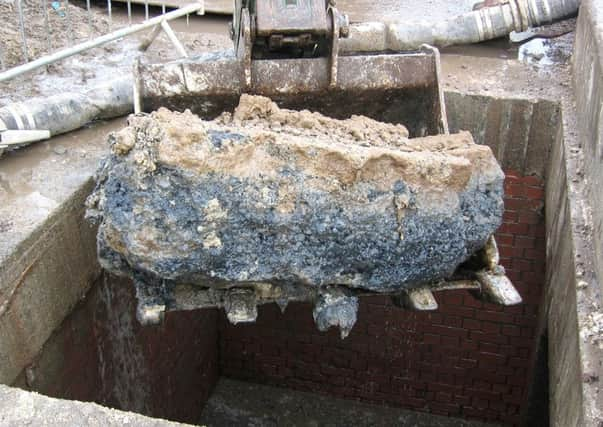Fight against sewer-blocking fatbergs takes a step forward


Fatbergs form when wipes, fats, oils and grease build up and congeal into a solid lump.
Occurrences have been increasing in recent years. A massive, 250m-long mass weighing as much as 19 elephants was discovered in London in 2017, while a 64m monstrosity was removed from a sewer in Devon this week.
Gigantic fatbergs have also clogged pipes in Scotland.
Advertisement
Hide AdAdvertisement
Hide AdStudies have shown that non-flushable wet wipes, baby wipes in particular, make up as much as 93 per cent of the material causing some of the most severe blockages.
Now wipes manufacturers can feature an official water industry Fine to Flush symbol on packaging if the product passes strict scientific tests.
The logo will confirm the products do not contain plastic and will break down in the sewer system.
Water UK chief executive Michael Roberts said: “This is an important step in the battle against blockages. We’ve all seen the impact of fatbergs recently, and we want to see fewer of them.
“Improving the environment is at the core of what the water industry does, and the new ‘Fine to Flush’ standard that we’ve created will make it easier for consumers to buy an environmentally friendly product instead of one which clogs up drains and sewers.”
There are around 300,000 drain and sewer blockages across the UK each year, including 40,000 in Scotland.
Fixing the problems cost the nation £100 million annually.
Flooding sewers also damage the environment, polluting rivers and seas. Marine Conservation Society surveys show Scottish beaches are among the worst hit by sewage-related debris.
Peter Farrer, chief operating officer at Scottish Water, said: “Our sewer response workers deal with the consequences of people flushing the wrong items down the toilet – items like wipes, cotton buds and sanitary products – on a daily basis.
Advertisement
Hide AdAdvertisement
Hide Ad“We hope this new official standard, Fine to Flush, will help cut consumer confusion and lead to a reduction in blockages.
“In the meantime, we still encourage customers to only flush the three Ps – pee, poo and paper.”